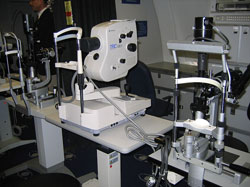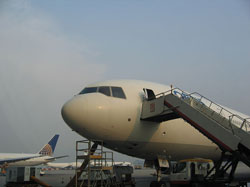Being blind can be a death sentence to a child in sub-Saharan Africa, a region with the highest prevalence of blindness in the world - 1.24 per 1000 children, compared to 0.8 in India and 0.3 in Europe. The World Health Organisation (WHO) estimates that up to 60% of infants that go blind in poorer socio-economic groups are likely to die within two years of becoming blind. What is of concern is the fact that approximately 50% of childhood blindness is avoidable.
On 4 and 5 May international experts in paediatric eye care have gathered in Cape Town to plan a five-year strategy to bring quality paediatric eye care to the children of sub-Saharan Africa. Hosted by ORBIS, a global sight-saving organisation which has worked in 88 countries since its inception in 1982, the Planning for Comprehensive Eye Care for Children in sub-Saharan Africa conference will focus on developing a comprehensive model for managing avoidable childhood blindness in the region.
Improving paediatric eye care in Africa is a key focus
"Improving paediatric eye care is a key focus for ORBIS in Africa," says Lene Øverland, director of programme, ORBIS Europe, Middle East and Africa. "Yet with so much to be done we believe no single player can do it all. This meeting is an opportunity for all those involved to develop a strategic and collaborative plan together. Our experience globally has proven that by working in partnership we can get closer to our Vision 2020 goal of alleviating preventable blindness."

Blind children in sub-Saharan Africa face three major challenges: "Firstly many are not being reached early enough for successful intervention; secondly these children are extremely vulnerable - about half are likely to die within two to three years of becoming blind; thirdly there is very little infrastructure and specialised medical help available to them," says Dr Daniel Etya'ale, executive director for Africa for the International Agency for the Prevention of Blindness's (IAPB) and a member of ORBIS's Africa Initiative Steering Committee.
75% of the causes of childhood blindness are treatable
Etya'ale says that the high mortality rate of blind children may be a result of the condition which has caused the blindness, for example Vitamin A deficiency (xerophthalmia). "But it can also simply be that by becoming blind these children drop to being the poorest of the poor in impoverished rural communities with limited resources.'
Yet 75% of the causes of childhood blindness are treatable. The trouble is that many children access services too late, when vision is damaged beyond repair. The other challenge is that a child's eye is significantly different to an adult's eye and the care and treatment requires specialised skills and equipment.
Through the conference ORBIS aims to kick-start collaborative initiatives to train medical staff across the sub-continent, strengthen existing eye care clinics and develop a plan to open at least 10 new paediatric eye care facilities within 10 years.
According to WHO recommendations, one paediatric ophthalmic centre is necessary per 10 million populations. Sub-Saharan Africa is grossly under-catered for: South Africa only has one dedicated children's facility at Red Cross War Memorial Children's Hospital in Cape Town, and many countries in the region do not even have a paediatric ophthalmologist. "There are fewer paediatric ophthalmologists and paediatric eye centres in Africa than anywhere else in the world," said Dr Hunter Cherwek medical director of the ORBIS Flying Eye Hospital, "this is an urgent priority for public health."
Mapping a strategy
Professor Colin Cook, Head of Ophthalmology at the University of Cape Town, Groote Schuur Hospital and Red Cross War Memorial Children's Hospital is speaking at the conference, "This is not a talk shop. ORBIS is bringing together a group of professionals who work in the field of eye care and blindness prevention in Africa, many with expertise in paediatric ophthalmology, to map a strategy that should optimise the efficiency and effectiveness of the work that is being done."
"You could spend your whole life crying about the massiveness of the challenge," says Dr Etya'ale. "But the good news in blindness prevention is that many simple and successful interventions exist and when carried out effectively, you can see real change in a short period of time. This is a major incentive to me to always do more."
ORBIS is a non-profit organisation committed to saving sight worldwide. It has been active in 88 countries since its inception in 1982, latterly establishing 28 paediatric eye care clinics in India since 2007.
ORBIS uses flagship tools such as the ORBIS Flying Eye Hospital, a mobile ophthalmic training hospital on-board a DC-10 airplane; Cyber-Sight, an online telemedicine mentoring and teaching resource; and over 450 expert medical volunteers, to bring quality eye care and training to its partners in developing countries. To date ORBIS has enhanced the skill of over 260 000 health care professionals and helped establish services that have provided quality eye care to more than 12 million people.
ORBIS in Africa: ORBIS opened a Southern Africa programme office in Cape Town in late 2010 and an Africa programme office in Ethiopia in 1999. The ORBIS Flying Eye Hospital has visited numerous African countries including Ethiopia, Uganda, Ghana, Cameroon, Tanzania, Mali, Malawi, Botswana, Kenya and very recently Nigeria. Since 2010 ORBIS has been working in Zambia and South Africa to develop dedicated children's eye clinics. At Kitwe Central Hospital in Zambia ORBIS is currently refurbishing a 35 bed-ward and procuring specialised equipment. ORBIS has also done extensive training and mentoring in Zambia with ophthalmologist Dr Chileshe Mboni.
"ORBIS has the potential to have a major impact on the provision of eye care services in Africa, especially as paediatric facilities are rare and under-resourced,' says Øverland.
For more information go to www.ORBIS.org.za.
Issued on behalf of ORBIS Southern Africa (www.ORBIS.org.za) by Paula Wilson Media Consulting (www.pwmc.co.za).
For media queries, interviews or visuals please contact Paula Wilson Media Consulting on (021) 789 1904 or Cathy Williams on (021) 782 2847 / (084) 682 2847 / cathy@pwmc.co.za.






























